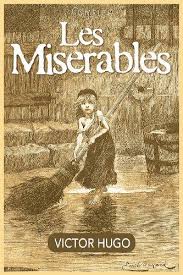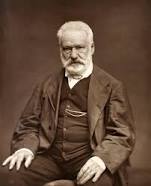Les Misérables Page #18
Les Misérables is a French historical novel by Victor Hugo, first published in 1862, that is considered one of the greatest novels of the 19th century. In the English-speaking world, the novel is usually referred to by its original French title.
Be it said in passing, that success is a very hideous thing. Its false resemblance to merit deceives men. For the masses, success has almost the same profile as supremacy. Success, that Menæchmus of talent, has one dupe,--history. Juvenal and Tacitus alone grumble at it. In our day, a philosophy which is almost official has entered into its service, wears the livery of success, and performs the service of its antechamber. Succeed: theory. Prosperity argues capacity. Win in the lottery, and behold! you are a clever man. He who triumphs is venerated. Be born with a silver spoon in your mouth! everything lies in that. Be lucky, and you will have all the rest; be happy, and people will think you great. Outside of five or six immense exceptions, which compose the splendor of a century, contemporary admiration is nothing but short-sightedness. Gilding is gold. It does no harm to be the first arrival by pure chance, so long as you do arrive. The common herd is an old Narcissus who adores himself, and who applauds the vulgar herd. That enormous ability by virtue of which one is Moses, Æschylus, Dante, Michael Angelo, or Napoleon, the multitude awards on the spot, and by acclamation, to whomsoever attains his object, in whatsoever it may consist. Let a notary transfigure himself into a deputy: let a false Corneille compose Tiridate; let a eunuch come to possess a harem; let a military Prudhomme accidentally win the decisive battle of an epoch; let an apothecary invent cardboard shoe-soles for the army of the Sambre-and-Meuse, and construct for himself, out of this cardboard, sold as leather, four hundred thousand francs of income; let a pork-packer espouse usury, and cause it to bring forth seven or eight millions, of which he is the father and of which it is the mother; let a preacher become a bishop by force of his nasal drawl; let the steward of a fine family be so rich on retiring from service that he is made minister of finances,--and men call that Genius, just as they call the face of Mousqueton Beauty, and the mien of Claude Majesty. With the constellations of space they confound the stars of the abyss which are made in the soft mire of the puddle by the feet of ducks. CHAPTER XIII--WHAT HE BELIEVED We are not obliged to sound the Bishop of D---- on the score of orthodoxy. In the presence of such a soul we feel ourselves in no mood but respect. The conscience of the just man should be accepted on his word. Moreover, certain natures being given, we admit the possible development of all beauties of human virtue in a belief that differs from our own. What did he think of this dogma, or of that mystery? These secrets of the inner tribunal of the conscience are known only to the tomb, where souls enter naked. The point on which we are certain is, that the difficulties of faith never resolved themselves into hypocrisy in his case. No decay is possible to the diamond. He believed to the extent of his powers. "Credo in Patrem," he often exclaimed. Moreover, he drew from good works that amount of satisfaction which suffices to the conscience, and which whispers to a man, "Thou art with God!" The point which we consider it our duty to note is, that outside of and beyond his faith, as it were, the Bishop possessed an excess of love. It was in that quarter, quia multum amavit,--because he loved much--that he was regarded as vulnerable by "serious men," "grave persons" and "reasonable people"; favorite locutions of our sad world where egotism takes its word of command from pedantry. What was this excess of love? It was a serene benevolence which overflowed men, as we have already pointed out, and which, on occasion, extended even to things. He lived without disdain. He was indulgent towards God's creation. Every man, even the best, has within him a thoughtless harshness which he reserves for animals. The Bishop of D---- had none of that harshness, which is peculiar to many priests, nevertheless. He did not go as far as the Brahmin, but he seemed to have weighed this saying of Ecclesiastes: "Who knoweth whither the soul of the animal goeth?" Hideousness of aspect, deformity of instinct, troubled him not, and did not arouse his indignation. He was touched, almost softened by them. It seemed as though he went thoughtfully away to seek beyond the bounds of life which is apparent, the cause, the explanation, or the excuse for them. He seemed at times to be asking God to commute these penalties. He examined without wrath, and with the eye of a linguist who is deciphering a palimpsest, that portion of chaos which still exists in nature. This revery sometimes caused him to utter odd sayings. One morning he was in his garden, and thought himself alone, but his sister was walking behind him, unseen by him: suddenly he paused and gazed at something on the ground; it was a large, black, hairy, frightful spider. His sister heard him say:-- "Poor beast! It is not its fault!" Why not mention these almost divinely childish sayings of kindness? Puerile they may be; but these sublime puerilities were peculiar to Saint Francis d'Assisi and of Marcus Aurelius. One day he sprained his ankle in his effort to avoid stepping on an ant. Thus lived this just man. Sometimes he fell asleep in his garden, and then there was nothing more venerable possible. Monseigneur Bienvenu had formerly been, if the stories anent his youth, and even in regard to his manhood, were to be believed, a passionate, and, possibly, a violent man. His universal suavity was less an instinct of nature than the result of a grand conviction which had filtered into his heart through the medium of life, and had trickled there slowly, thought by thought; for, in a character, as in a rock, there may exist apertures made by drops of water. These hollows are uneffaceable; these formations are indestructible. In 1815, as we think we have already said, he reached his seventy-fifth birthday, but he did not appear to be more than sixty. He was not tall; he was rather plump; and, in order to combat this tendency, he was fond of taking long strolls on foot; his step was firm, and his form was but slightly bent, a detail from which we do not pretend to draw any conclusion. Gregory XVI., at the age of eighty, held himself erect and smiling, which did not prevent him from being a bad bishop. Monseigneur Welcome had what the people term a "fine head," but so amiable was he that they forgot that it was fine.
Translation
Translate and read this book in other languages:
Select another language:
- - Select -
- 简体中文 (Chinese - Simplified)
- 繁體中文 (Chinese - Traditional)
- Español (Spanish)
- Esperanto (Esperanto)
- 日本語 (Japanese)
- Português (Portuguese)
- Deutsch (German)
- العربية (Arabic)
- Français (French)
- Русский (Russian)
- ಕನ್ನಡ (Kannada)
- 한국어 (Korean)
- עברית (Hebrew)
- Gaeilge (Irish)
- Українська (Ukrainian)
- اردو (Urdu)
- Magyar (Hungarian)
- मानक हिन्दी (Hindi)
- Indonesia (Indonesian)
- Italiano (Italian)
- தமிழ் (Tamil)
- Türkçe (Turkish)
- తెలుగు (Telugu)
- ภาษาไทย (Thai)
- Tiếng Việt (Vietnamese)
- Čeština (Czech)
- Polski (Polish)
- Bahasa Indonesia (Indonesian)
- Românește (Romanian)
- Nederlands (Dutch)
- Ελληνικά (Greek)
- Latinum (Latin)
- Svenska (Swedish)
- Dansk (Danish)
- Suomi (Finnish)
- فارسی (Persian)
- ייִדיש (Yiddish)
- հայերեն (Armenian)
- Norsk (Norwegian)
- English (English)
Citation
Use the citation below to add this book to your bibliography:
Style:MLAChicagoAPA
"Les Misérables Books." Literature.com. STANDS4 LLC, 2025. Web. 7 Feb. 2025. <https://www.literature.com/book/les_mis%C3%A9rables_13>.








Discuss this Les Misérables book with the community:
Report Comment
We're doing our best to make sure our content is useful, accurate and safe.
If by any chance you spot an inappropriate comment while navigating through our website please use this form to let us know, and we'll take care of it shortly.
Attachment
You need to be logged in to favorite.
Log In